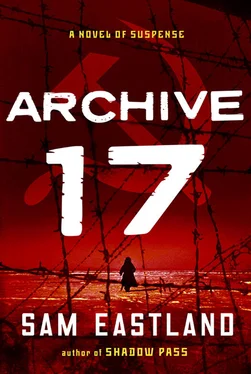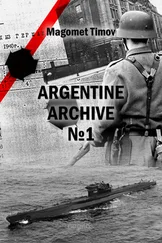Sam Eastland - Archive 17
Здесь есть возможность читать онлайн «Sam Eastland - Archive 17» весь текст электронной книги совершенно бесплатно (целиком полную версию без сокращений). В некоторых случаях можно слушать аудио, скачать через торрент в формате fb2 и присутствует краткое содержание. Жанр: Исторический детектив, на английском языке. Описание произведения, (предисловие) а так же отзывы посетителей доступны на портале библиотеки ЛибКат.
- Название:Archive 17
- Автор:
- Жанр:
- Год:неизвестен
- ISBN:нет данных
- Рейтинг книги:3 / 5. Голосов: 1
-
Избранное:Добавить в избранное
- Отзывы:
-
Ваша оценка:
- 60
- 1
- 2
- 3
- 4
- 5
Archive 17: краткое содержание, описание и аннотация
Предлагаем к чтению аннотацию, описание, краткое содержание или предисловие (зависит от того, что написал сам автор книги «Archive 17»). Если вы не нашли необходимую информацию о книге — напишите в комментариях, мы постараемся отыскать её.
Archive 17 — читать онлайн бесплатно полную книгу (весь текст) целиком
Ниже представлен текст книги, разбитый по страницам. Система сохранения места последней прочитанной страницы, позволяет с удобством читать онлайн бесплатно книгу «Archive 17», без необходимости каждый раз заново искать на чём Вы остановились. Поставьте закладку, и сможете в любой момент перейти на страницу, на которой закончили чтение.
Интервал:
Закладка:
“Is there nothing more I can do, Inspector?”
“There may well be,” he replied, “but I won’t know until I get to Borodok.”
“How will I stay in contact with you?”
“By telegram through the camp commandant, Major Klenovkin. He will make sure I receive any messages.”
The two men shook hands.
“I will see you on the other side,” said Kirov, giving the traditional farewell.
“Indeed you will, Major Kirov.”
As Pekkala made his way across the rail yard, heading towards the group of convicts, he was spotted by the train’s chief engineer, a man named Filipp Demidov.
Demidov was the brother of Anna Demidova, lady-in-waiting to the Tsarina Alexandra, who had been murdered in July of 1918 by agents of the Bolshevik Secret Service, the Cheka, in the same executions which claimed the lives of the Tsar, his wife, and his five children.
Several years before her death, Anna Demidova had secured for her brother a post as the Tsar’s chauffeur, a job he held until the staff at Tsarskoye Selo was dismissed in March of 1917. Immediately afterwards, Demidov went to work for the State Railways and had been with them ever since.
In his days as a chauffeur, Demidov had often seen Pekkala coming and going from meetings with the Tsar. He had, on occasion, driven Pekkala into the city of St. Petersburg in the Tsar’s Hispano-Suiza Alfonso XIII sedan. Once, by accident, he had even sat down next to Pekkala at the restaurant where the inspector used to take most of his meals-a rough and simple place called the Cafe Tilsit, where customers ate from earthenware bowls at long, bare-wood tables.
Demidov, who had a good memory for faces, had used the occasion to make a careful study of the inspector. Seeing the Emerald Eye among these common criminals overrode all his instincts of self-preservation. He climbed down from the engine and strode quickly across to Pekkala.
“Demidov!” he gasped, instantly recognizing the former chauffeur.
“Inspector,” replied the chief engineer, “you must come with me at once.”
What Demidov hoped to accomplish with this meeting, Pekkala had no idea, but it was too late now, as the last of the convicts were already climbing on board. There was no way he could join them without drawing attention to himself. So, rather than jeopardize his cover, Pekkala followed Demidov into the shadows.
“The prisoners aboard this train are going to their deaths.” Demidov’s hoarse whisper cut through the frosty air. “I can’t let that happen to you.”
“I cannot explain to you why,” replied Pekkala, “but one way or another, I must get aboard that train.”
Demidov’s back straightened as he realized his mistake. “My God, what have I done?”
“Nothing that cannot be fixed.”
“Whatever it takes,” Demidov vowed, “consider it done, Inspector.”
By the time ETAP-1889 finally departed, the sun had already set. Pekkala stood with Demidov at the engine controls as the great cyclopic eye of the locomotive’s headlight carved out a path through the darkness.
The convoy was more than fifty wagons long. Each had been designed to hold either forty men or eight horses, after the pattern used by the French army during the Great War. The French wagons had occasionally held as many as sixty men, but the wagons of ETAP-1889 now contained eighty men each, which meant that for the entire ten-day journey to Siberia everyone would be forced to stand.
“Where is the next station?” Pekkala had to shout to make himself heard above the rumble of the locomotive.
“There’s a switching junction called Shatura, about ten kilometers down the line, but we aren’t due to stop there.”
“Is there any way you can halt the train at that junction?”
Demidov thought for a moment. “I could tell them our brakes are overheating. That would require a visual inspection of the wheels. The process would take about twenty minutes.”
“Good,” said Pekkala. “That is all the time I need.”
The master of the V-4 station, Edvard Kasinec, had been informed earlier that day to expect the arrival of a special prisoner for convoy ETAP-1889. The convoy would be passing through Sverdlovsk, Petropavlovsk, and Omsk, destined for the Valley of Krasnagolyana, in the farthest reaches of Siberia.
Sometimes, through the frosted windows of his office, Kasinec would study the procession of convicts as they were herded at bayonet point into the wagons, wearing nothing but the flimsy cotton pajamas issued to them in the prisons of Butyrka and Lubyanka. Kasinec would try to pick out those he imagined might survive the ordeal that lay ahead. A few might even be lucky enough to return home one day. It was a little game he played to pass the time, but he never played it with convoys traveling as far as the Valley of Krasnagolyana. Those men were bound for camps whose names were spoken only in whispers. They were never coming back.
It had saddened him to learn that this special prisoner was none other than Inspector Pekkala of the Bureau of Special Operations. Kasinec was old enough to remember the days when Pekkala had served as personal investigator to the Tsar. To think of that famous detective packed inside a freezing cattle wagon like a common criminal was almost more than Kasinec could bear.
There had been so many thousands, tens of thousands, who had passed through here on their way east, and Kasinec had been grateful for the fact that they would only ever be numbers to him. If there had been names, he would have remembered them, and if he had remembered them, the space they would have occupied inside his head might have driven him out of his mind. But he would never forget the name of Pekkala, whose Emerald Eye had snagged like a fishing lure trolling through his brain.
Kasinec’s orders were to wait until Pekkala had boarded the train, and then to communicate by telegram with some man at the Kremlin named Poskrebyshev to confirm that the prisoner had been delivered.
On receiving the instructions from Poskrebyshev, Kasinec had protested that he had never actually seen the Emerald Eye before. Few people ever had, since his picture had never been published.
“How will I even know it is him?” he asked.
Poskrebyshev’s voice crackled down the phone line. “His prison number is 4745.”
Kasinec breathed in, ready to explain that the numbers inked onto those flimsy prison clothes were often so blurred as to be illegible, but Poskrebyshev had already hung up. Following his orders, Kasinec had notified the guards to keep an eye out for prisoner 4745 and to make sure he was placed aboard wagon #6.
Kasinec stood on the platform, studying the number of each convict who boarded the train. But none of these men was Pekkala. He held up the transport as long as he could, until the switching junction in Shatura called and demanded to know what had become of ETAP-1889. Finally he gave the order for the convoy to proceed. Then, with a quiet satisfaction, Kasinec sent a telegram to Poskrebyshev, informing him that prisoner 4745 was not aboard the train.
Kasinec guessed there would be hell to pay for this and also that he would be the one to pay it, but it comforted him to know that the great inspector had somehow found a way to beat the odds.
It crossed Kasinec’s mind that the stories he had heard about Pekkala might be true-that he was not even a man but rather some kind of phantom, conjured from the spirit world by the likes of Grigori Rasputin, that other supernatural in the service of the Tsar.
Once more, the double doors of Stalin’s office flew open and Stalin appeared, waving a flimsy piece of telegram paper, his lips twitching with anger. “This message just arrived from the master of the V-4 station, saying that Pekkala was not aboard the train!”
Читать дальшеИнтервал:
Закладка:
Похожие книги на «Archive 17»
Представляем Вашему вниманию похожие книги на «Archive 17» списком для выбора. Мы отобрали схожую по названию и смыслу литературу в надежде предоставить читателям больше вариантов отыскать новые, интересные, ещё непрочитанные произведения.
Обсуждение, отзывы о книге «Archive 17» и просто собственные мнения читателей. Оставьте ваши комментарии, напишите, что Вы думаете о произведении, его смысле или главных героях. Укажите что конкретно понравилось, а что нет, и почему Вы так считаете.











